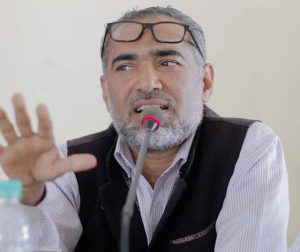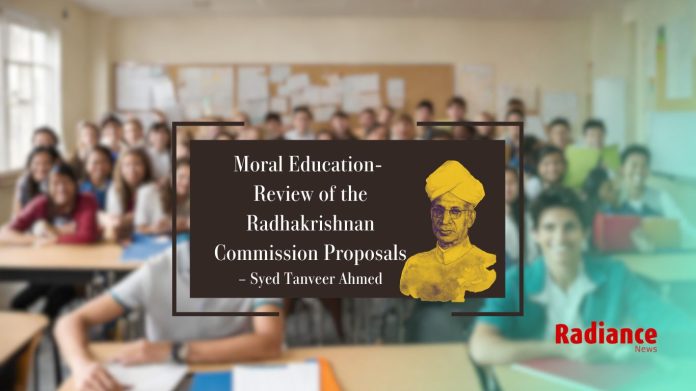
– Syed Tanveer Ahmed
In most democratic countries, we observe that the rights and demands of citizens are not secured without a prolonged struggle. This situation becomes even more dismal when it comes to the rights of minorities. In a democratic form of government, laws and government decisions are made by majority opinion, however, a conscious and vigilant minority can overwhelm the majority. America and India provide clear examples of this phenomenon. Unfortunately, the Muslims of India have been looking at democracy only through the prism of elections. The Muslim community is busy with who should they vote for and who should they not. How many Muslim MPs and MLAs belong to their community? Nothing is envisaged beyond this. They consider Muslim political representation in Parliament and Legislative Assemblies the alpha and omega of political assertion.
A cursory review of politics since Independence shows that the Muslim community has made very little effort to amend a law or a policy and get it passed in Parliament or Assemblies. However, we have carried out massive protests to oppose laws, to amend or ensure that they are scrapped. Have we assumed that voting is the only form of protest in democracy? Raising one’s voice against oppression and injustice is certainly a virtue. However, education and training for the establishment of justice is also a virtue. Striving to build an education system and taking concerted and systematic efforts for the same is a great virtue. Of course, the Parliament plays an important role in democratic countries, but vigilant and active groups and organizations also achieve their goal in a democracy by influencing public opinion and lawmakers.
After the partition of the country, the Muslim community suffered from trauma and serious emotional problems. One problem that the Muslim community of India had to encounter was the false accusation that it alone was responsible for the Partition. Second, the Muslim community and the Muslim organizations were busy in the protection of its religious identity. The third problem was the concern for the protection of their lives and property, which was under attack through an unending series of communal riots and pogroms.
In this situation, thinking and voicing concern for the welfare of the Muslim community and the citizens of the country was a very difficult task. Perhaps, because of these reasons, the Indian Muslims could not participate and voice their opinion about the education policies in the country as much as they should have. After 70 years of Independence, the community should at least address it now.
Jamaat-e-Islami Hind has included education in its policy and program since its inception. It is trying to play a beneficial role in the field of education but still needs to work continuously by collaborating with other organizations, working in the field of education, to influence the education policies of the country. This work can be done effectively only when we understand the laws, policies and reforms that have been taking place in India regarding education.
As Indian Muslims are more interested in religious and moral education, we have started this series of articles. It is also true that we can address and solve various social and political evils through moral education. In the last articles, we reviewed two important commissions. Both commissions were related to primary and higher primary education. Below we will introduce the commission that was formed to reform higher education. Here we are presenting only those points, which are relevant to our main topic “Moral Education.” These points provide us with material for dialogue with the government (be it central or state) and can also help us in formulating policy.
Dr Radhakrishnan Commission
After India’s Independence, the then Congress government led by Prime Minister Jawaharlal Nehru faced many challenges. One of them was education. Since the education system was designed by Macaulay, it had two main weaknesses and drawbacks. First, the system designed by Macaulay transformed students into pliant employees for the British government who were loyalists and preachers of imperialism. Secondly, there was no scope for religious education in this system.
After Independence, these two objectives had to be changed. It was discussed that the “future of the country” is prepared and groomed in the classrooms of our schools and colleges. A country is not built with mortar and bricks but through education. The country needs leaders and it is undeniable that they are nurtured and trained in universities. If we want to bring social change to the country, we must universalize education. The welfare of women lies in bringing them under the fold of education.
The people of our country are deeply religious, so religious education should be included in our education system. Moral education is not possible without spirituality, so programs should be organized in educational institutions for spiritual upliftment. Science, technology and vocational education should be promoted, etc.
In response to these demands regarding education, Maulana Abul Kalam Azad was made the country’s first Education Minister. It is said that former Prime Minister Jawaharlal Nehru was convinced of Maulana’s vision. As soon as Maulana assumed office, he started the process of fundamental changes in the field of education in India. He established a commission called “University Education Commission” on 6 December 1948, to review higher education (university education).
The main objective of this commission was to submit proposals to the government for reforms in the field of higher education. It was the country’s first commission. Its establishment was a manifestation of the concern of the then government and the leaders of the country that the students studying in the different universities of the county were going to take over the reins of governance and administration of the country after graduating from these universities. Therefore, the universities had to provide the necessary thought and training that could give the students the ability to implement and execute the blueprint of building a new India.
Maulana Azad delivered a speech whilst inaugurating the commission, in which he spelt out the objectives and terms of reference of the commission. We tried to get a record of this speech but did not succeed. The official name of this commission is “University Education Commission” but it is also known as Dr. Radhakrishnan Commission. It acquired this name as it was chaired by Dr Sarvepalli Radhakrishnan. Dr Radhakrishnan was born in Tiruttani of North Arcot district in the erstwhile Madras Presidency (now in Tiruvallur district of Tamil Nadu). He was the Vice Chancellor of Banaras Hindu University (BHU). He was appointed Chairman of the University Education Commission while he was the VC of BHU. Later on, he was elected to the post of Vice President of India (1952) and then President of India (1962). He was born on 5 September 1888. In 1960, some of his students organized a birthday party for him. In this program, Dr. Radhakrishnan said that he would be happy if his birthday was dedicated to the teachers of the world. Therefore, since 5 September 1962, Dr Radhakrishnan’s birthday is celebrated as “Teacher’s Day” in India.
(to be continued)




